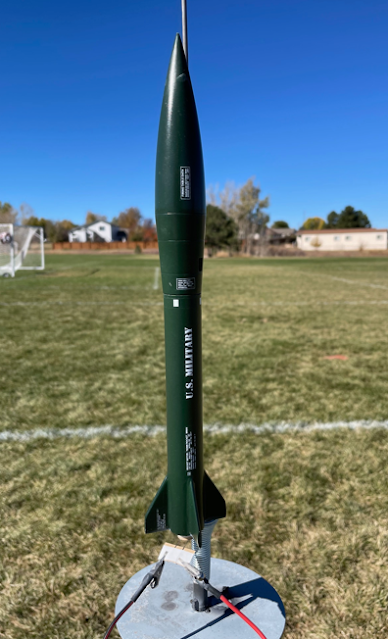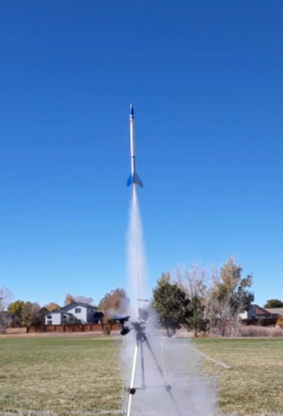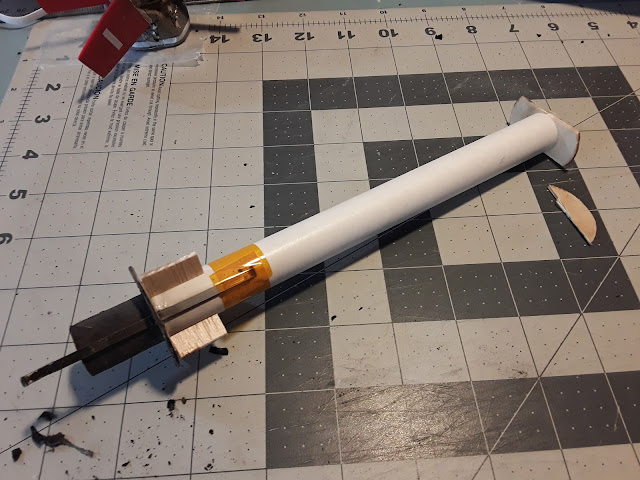Friday, October 20th, provided incredibly perfect rocket flying weather conditions in Castle Rock, Colorado, thanks to a high-pressure cell that had parked over the state for the past week.
Mike Perreault and myself journeyed out to Founders Park to take advantage of the completely sunny and calm conditions on a well-manicured field.
It was definitely a day to bring out the C and D class motors without any trepidation about losing models!
Mike started things off with a perfect maiden flight of a Little John clone, on A10 -3T power.
 |
| Photo by Mike Perreault |
My first flight of the session went to, of course, the fleet flagship EAC Viper. The bird's fifteenth launch went very well on a B6-4 motor.
Next up: Mike's Mini Honest John for a perfect A10-3T launch and recovery.
Mike had done a great job of pre-prepping birds the night before, so he was quickly ready to go with his next launch. This would be the maiden voyage of an
Estes EAC Firecat clone, sitting atop a B6-4. A great flight,
straight and true. Low winds led to a very close recovery.
I soon had my second bird readied on the pad, a Quest Nike K.
Powered by a C5-3 motor the model's 7th flight was a great success, boosting straight and high, with close-by recovery.By this time a trio of middle school aged boys happened by to watch the rockets fly. One of them pushed the launch button on this one, and all three went out on recovery.
These lads had a great time during their brief visit. All seemed genuinely interested. Some potential newcomers to the hobby, perhaps? Shown here holding the recovered Nike-K and Mike's Bullpup:

Mike soon had yet another bird on the pad, an Estes High Flyer, flying on
a C6-7.
"First flight for a recent repaint, 4th flight for the
airframe. This was a great flight, altitude with attitude.
It really ripped into the sky. Perfect deployment of a single
streamer. Upon retrieval, the nose cone was missing. The
kevlar line was intact, indicating a fail of the plastic loop on the nose
cone. Grounded for the remainder of the day."
One of the visitors launches the Hi Flier while Mike looks on:
Mike's next flight was made with an Estes Bullpup on a C6-7. "Always a favorite flyer, this one didn’t disappoint as
it streaked skyward. Recovery deployment was not quite as stellar,
as a shroud line had wrapped around the chute and the Bull Pup returned with a
‘streamer- like’ descent. Fortunately, no damage. Based
on my poor record keeping, I would say this was the 6th flight for the Bull
Pup."
Next up from my arsenal was the Griffin-2 custom design. This would be the bird's 10th flight. With an Estes altimeter attached to the nose base, the model boosted very nicely on a
B6-4 motor.
At ejection, it was noted that the model had separated. The nose came down via parachute, while the booster rocket and altimeter free fell. No parts sustained any damage and the altimeter read 454 feet.
I'll claim a successful mission!
 |
| Photo by Mike Perreault |
Next bird to fly was Mike's "DoorBelle", a scratch
built BT-60 downscale of the Estes Doorknob.
"This was the third
flight for the airframe, and the first flight after adjusting the nose weight
and CG. A C6-5 gave it a high loft, with a slight arc.
Perhaps a little more tuning."
By the time Mike had returned with his model, I was prepping one of my fleet favorites, the Skeeter Eeter 3. This is a BT-60 upscale of the Mosquito.
 |
| Photo by Mike Perreault |
The SE3 ready on the pad prior to a perfect C11-5 powered flight:
The bird almost stuck a three-point fin-tip landing on the turf a la Space-X, but the chute tugged it over at the last second.
Curiously, the model landed very close to a large red 'X' painted on the grass.
A am unable to ascribe any significance whatsoever to this, but it was interesting, nonetheless.
With the wind conditions remaining very calm, Mike pulled out the big guns. This was in the form of an Estes Goblin:
"This was the third flight
for the airframe. Winds had dropped to near zero, so the Goblin was
stuffed with a D12-5 and blasted into the blue. A perfect flight,
ejection and a dual streamer deployment. However, one of the streamers wrapped up with the nose cone, and the landing came in hard. The
Goblin is off to the VAB for a fin repair."
Mike followed up this flight with another go with the EAC Firecat:
"The second flight of the
EAC Firecat was on a C6-5. I was second guessing this one, after
the Goblin carnage. I am so happy with the final build of the Firecat, I
would hate to see it damaged. However, it flew straight and true, a
perfect deployment and super short walk for recovery. This one may
sit on the shelf for a bit."
My next flight was executed by an Estes Viking. This one hadn't seen any air-time for over two years, so it found its way into the model tote for this flying session. The bird, powered by a B6-4 motor, flew very straight and high, popped its 10-inch square parasheet, and began drifting earthward. I ran after it and managed to grab it before it touched down. Not bad for an old geezer!
 |
| Photo by Mike Perreault |
Next on the pad was Mike's beautifully built and finished 'candy' Red Max:"The third flight for Der
Candy Apple Red Max, powered by a C6-5. This was an awesome flight,
straight and true. Perfect deployment and a super gentle landing, under
the 18” Skull and Crossbones!"
Since the weather was perfect, and Mike was on a roll, he broke out his next model:
"My first rocket, the Estes
Patriot Missile. This is the, roughly, 7th flight for the M-104
model, one of my favorite and most reliable flyers. It was loaded with a
C6-5, cleared the rod, angled hard left and porpoised for about 50’ before
burrowing into terra firma. After a moment's pause, the ejection fired
successfully. Ugh!
Upon further review, it looked like a defective engine. The engine casing was full of material, with just a thin burned path. Fortunately, no
damage to the Patriot."
"That was the end of the
planned flights, and I didn’t want to end on a bad flight, so I reloaded the
Patriot with another C6-5, and it flew straight and true. The upper winds
had shifted, and it drifted a bit west on the descent, landing in a rocket
eating tree. After 20 or so minutes of finagling, it was retrieved
from the tree, no worse for wear.
How to extract a model from a Rocket Eating Tree....
Mike's Patriot had headed for and landed in a thick grove of aspen trees just outside of the park perimeter.
One of the trees had snagged the descending model around fifteen feet above the ground. Fighting our way through the thick growth, we reached the scene of the crime and began looking for a way to facilitate a rescue. Mike found a broken branch on the ground that looked long enough to reach the bird.
Nope...too short. Barely touched the aft end of the rocket.
We both tried pulling on the thin tree to see if we could eventually bend the top down far enough to reach the model.
Nope...tree too thick....wouldn't bend.
A further search on the ground yielded up a nearly entire downed tree, providing a stick about twelve feet long. This seemed to be the workable solution.
Here is a pic of the rescue. Mike is manipulating the make-shift pole to try and free the parachute from the offending branch. It was quite an epic battle. Man vs. aspen tree for possession of a scale model Patriot!
Ultimately, Mike managed to tug the whole works out of the tenacious tree.
Next it was a further trial in attempting to release the model and parachute from the rescue stick itself.
Sheesh!
After that it was just a matter of fighting our way out of the dense growth and finding our way back to civilization - and the launch site.
Mike decided that two unusually eventful flights for the Patriot was quite enough and decided not to try a third time.
After all of the excitement of 'trekking through the wilderness', I put up my final flight of the day, the very tiny futuristic Estes Star Seeker.
Flying on a 1/2A3-4T motor the model flew to a respectable altitude. Since the fin assemblies had been broken on each of several previous flights, and re-glued many times, the bird exhibited a corkscrew trajectory. Recovery was good despite a 6 inch para-wad descent.
Mike put up the session's last flight, a re-do of his Estes Little John.
"I figured I
would finish where I started, and reloaded the Little John with an A10-3.
Another perfect flight and recovery. A perfect end to a near
perfect day."
With that, we packed up and headed off into the sunset, leaving with the satisfaction of participating in a very pleasant day of flying rockets.
We also likely left behind a very disappointed rocket-eating aspen tree....




































